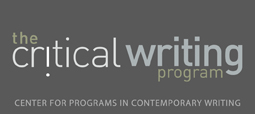History and Sociology of Science
An Overview of the Discipline
History and Sociology of Science examines the relationships between the technical practice of scientists, engineers, medical researchers, and clinicians, and the material, social, political and cultural context in which those practices occur. Researchers in History and Sociology of Science may adopt a humanities or social sciences approach to study science, technology, and medicine.
The University of Pennsylvania's undergraduate program includes two majors:- Health and Societies
- Science, Technology, and Society
Writing in the Discipline
Reasoning
Explanation vs. Justification
Dr. Moreno allows that some writing in the field is "more descriptive" while other writing can be "more polemical." Dr. Tresch agrees that "there's no straight answer…we don't hold ourselves to the standards of the biology lab, for instance. We don't write the same way… It's not that we're not interested in objectivity, it's just that we don't think there is an easy way to achieve it." For example, reviews and analyses of previous research will contain an element of justification for the author's opinions, while descriptions of the author's own research or acknowledgement of positions others have taken require more explanation.
Goals
Writing in the field of History and Sociology of Science primarily aims to affirm or critique existing positions. Dr. John Tresch states, "critique is motivated, and it's meant to make the world a better place." Along with affirming and critiquing positions, work in this field questions current scientific models, theories, and methods.
Evidence
Acceptable evidence comes from a variety of sources and can be either data- or text-based. Suitable textual evidence includes reports of studies as well as books and articles written by other authors in the field. Artifacts and architecture, along with the dominant world views about each, are other acceptable forms of evidence. Data-based evidence may be the result of a study, such as Dr. Tresch's study on combining neuroscience with meditation. Somtimes historical, theological, or anecdotal evidence is used.
Authorship
Writing in the field of History and Sociology of Science tends to be done by a single author. Dr. Tresch has never written a piece with more than one other author; however, he concedes that more collaborative work would be beneficial and a good goal for the discipline would be "to figure out ways to do more team research and have people who are affiliated with one location or museum working together." Dr. Moreno agrees that writing in the humanities is best embodied by an image of "the individual scholar sitting at a keyboard," but that there are some exceptions to the mostly single-author nature of History and Sociology of Science. For example, producing edited volumes from conferences can be collaborative, but the more critical type of writing in this field, the individual publication, is done alone.
Writing Tips
Important Criteria for Student Writing
- Reasoning and evidence
- Demonstrating mastery of others’ ideas
- Organization
- Style
- Grammar and mechanics
Common Student Errors
- Senior theses: choosing topics that are too large
- Incorporating too few resources
- Structuring papers incoherently
- Forming weak arguments
- Lack of development
- Lack of stylistic risks
Genre
Typical Student Assignments
- Term papers - often assigned in seminars.
- Essay-style midterms and finals
- Senior theses
Professional Writing
An interesting tension of objectivity often arises in professional writing. Objectivity is important, but there are some scenarios it simply is not possible.**Example?**
Professional writing includes, but is not limited to:
- Scholarly journal articles
- Books
- Reviews (and analyses) of previous research
HSS Home Page
© 2013 The University of Pennsylvania
Meet the Professors

Professor John Tresch
"I'm always pre-writing. I'll do many, many drafts of outlines..." More...

Professor Jonathan Moreno
"For the most part, I just write. I've never had a writer’s block..." More...
